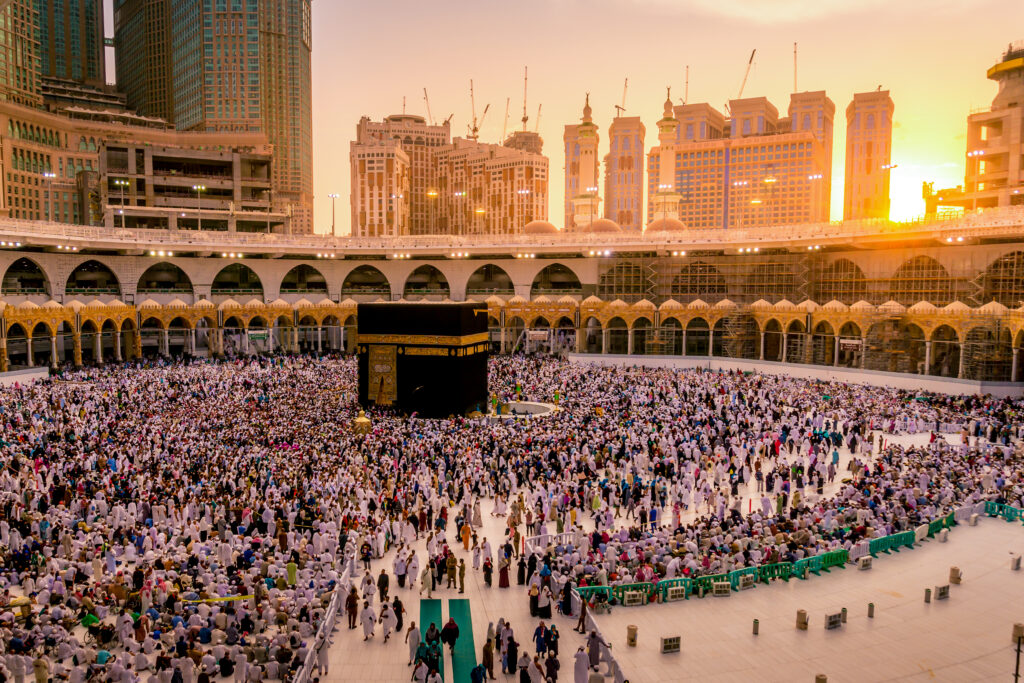Muslim-majority countries need to design more realistic emission plans

By ISNA Staff
September/October 2022
As we welcome back the hujjaj and celebrate their accomplishment, we also learn through their own stories and experiences how climate change is putting the hajj’s future at risk. According to a report by the non-profit organization Yayasan Indonesia Cerah (CERAH), there is a growing threat of dangerous heat stress for pilgrims. Faster global emission cuts are essential, and stronger action is needed from richer industrialized as well as from some Muslim-majority countries.
High temperatures, when combined with humidity, make it harder for people to cool down by sweating, as the air is already too full of moisture. The elderly are among the most vulnerable to heat stroke; however, when both the heat and humidity are high enough, even the young and healthy can fall sick — and sometimes die.
These conditions occur in Makka because humidity is often high when winds blow westward from the Red Sea. They are likely to become increasingly common and severe due partly to continued global warming. Global average temperatures have already risen by around 1.2°C / 2.16°F due to human activity, predominantly from burning fossil fuels, but also from deforestation and unsustainable agricultural practices.
Current climate policies put the world on track for around 2.7°C / 4.86°F warming before children born this year reach eighty. At this level, making the hajj during the summer will become especially dangerous, with 97% of the summer days reaching the “danger” threshold and about 20% reaching the “extreme danger” threshold — a level never before experienced in Makka.
The chances of reaching these thresholds would be greatly reduced if global warming were to be held to the Paris Agreement target of 1.5°C / 2.7°F. The chance of humid heat during the hajj season exceeding the “danger” threshold would be greater than it is currently, especially during the cooler months of May and June. However, the chance of reaching the “extreme danger” levels would be only 4% in September and 0% in all other months. In other words, performing the hajj would be much safer than current emission plans would make it.
The four countries most responsible for climate change to date are the U.S., China, Russia, and Brazil, along with the EU member states. The report notes that they — and other richer and higher-emitting countries — have the greatest responsibility and potential to decarbonize most quickly. Without faster action from them and other top emitters, making the hajj will become increasingly dangerous.
But action to limit their emissions alone won’t be enough. Global action will be necessary, and this includes emission cuts in countries that have not been among the top historical polluters or are not currently high-income countries.
The CERAH report examines the consequences of carbon emissions from Muslim-majority countries, as they are likely to have a particular interest in how climate change will impact the hajj. The report’s authors found that if other countries follow the emissions plans of Saudi Arabia, the UAE, Iran, Turkey, Bangladesh, Egypt and Indonesia, the hajj would eventually become too dangerous for many pilgrims.
The report makes the following point, among many others, that without widespread international action, including from large Muslim-majority countries, the hajj cannot be protected. Imam Saffet A. Catovic (head, ISNA Office for Interfaith, Community Alliances and Governmental Relations) observed, “The hajj is one of Islam’s five pillars, and climate change directly threatens its safety and, for many, its viability. As more Muslims ‘green’ their own hajj, governments and financial institutions must implement ambitious plans at the systemic level to scale up renewable energy development and phase down fossil fuels.”
The report also finds that some Muslim-majority countries are showing global leadership in their carbon-reduction plans. It singles out the Maldives and Morocco as having plans that are compatible with the Paris Agreement targets.
In 2016, ISNA publicly announced at COP 22 in Marrakech its intention to divest all of its holdings from the fossil fuel industry and reinvest part of them in renewable and clean energy solutions. It was the first national Muslim organization in the world to do so. The global fossil-fuel divestment movement now includes 1,500+ faith-based organizations and religious communities, academic institutions, foundations, pensions funds and many others worldwide that collectively have divested $40+ trillion to date.
ISNA continues to work at all levels with other value-based organizations and faith partners to decarbonize our economy and bring about a just transition to a fossil-free future through various programs and initiatives. The leader in this regard is its Green Initiatives Committee, which includes various environmental educational programs, Green Ramadan campaigns, partnership with the EPA Energy Star program for Mosques and Islamic Schools and other institutions.
Through its Office for Interfaith, Community Alliances and Governmental Relations, located in Washington, D.C., ISNA has advocated, petitioned and pushed for legislation and governmental policies to protect nature and natural systems. In addition, it focuses on the people’s right to a clean and healthy environment, especially those who live in the communities most impacted by climate change.
Most recently, ISNA has been strongly engaged with its values- and faith-based coalition partners to end financial support by banks and financial investment institutions, as well as government subsidies to the big oil companies. The organization is working hard to ensure that Congress passes legislation that provides immediate relief through a windfall profits tax that refunds Big Oil’s runaway profits to taxpayers and implement regulations that clamp down on the fossil fuel industry’s shameless price gouging.
Tell us what you thought by joining our Facebook community. You can also send comments and story pitches to horizons@isna.net. Islamic Horizons does not publish unsolicited material.
